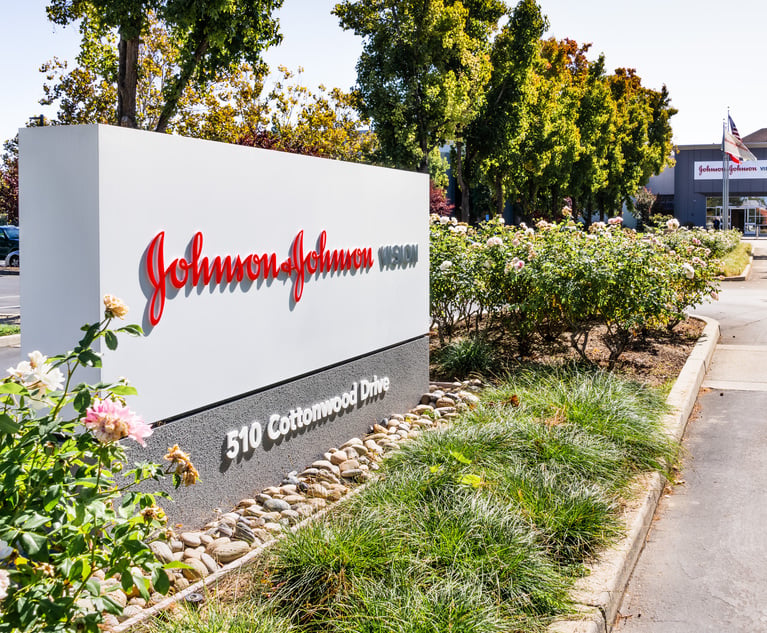Pa. Judge Blocks Transfer of Proprietary DNA Info Sought to Speed Development of COVID-19 Vaccine
Although Inovio contended that the transfer was necessary to develop sufficient quantities of a promising vaccine it already has in the works, Saltz said the notion that public benefit hinged on VGXI immediately transferring trade secret information was speculative.
June 26, 2020 at 01:21 PM
4 minute read
 Photo: angellodeco/Shutterstock.com
Photo: angellodeco/Shutterstock.com
A company that says it is developing a potential COVID-19 vaccine has asked for court action that would require a DNA manufacturing firm to divulge proprietary techniques in the hopes of ramping up production of a drug that could end the pandemic, but a Pennsylvania trial court judge has denied that request.
Judge Jeffrey Saltz of the Montgomery County Court of Common Pleas on Thursday denied a request for injunction that Plymouth Meeting-based drugmaker Inovio sought that would have compelled South Korean DNA manufacturer VGXI to transfer proprietary manufacturing processes to as many as 10 other manufacturers.
Saltz's decision is a win for Blank Rome, which represented the Korean DNA firm. Daniel Rhynhart, Michael Iannucci and Courtney O'Brien represented VGXI.
In an emailed statement, Rhynhart said, "We're pleased with the court's decision protecting our client's proprietary manufacturing technology. VGXI is proud to be manufacturing vaccine candidates for Covid-19, and remains committed to helping find a cure."
Gibbons' Stephen Finley represented Inovio. He did not immediately return a call seeking comment.
Although Inovio contended that the transfer was necessary to develop sufficient quantities of a promising vaccine it already has in the works, Saltz said the notion that public benefit hinged on VGXI immediately transferring trade secret information was speculative.
"There are more than a hundred other potential vaccines in development, any one of which may be the silver bullet (or one of multiple silver bullets) that can end this pandemic," Salts said. "Inovio has presented evidence that the results of its product thus far are very encouraging. But the history of pharmaceutical research contains countless examples of treatments that initially showed promise but ultimately failed to prove themselves safe and effective."
READ THE RULING:
The case comes as cases of the highly contagious coronavirus have been once again surging in parts of the United States, with a record number of new cases nationwide in a single day earlier this week. Along with taking the lives of hundreds of thousands of people across the globe, the illness has wreaked havoc on the world economy and is expected to leave lasting social effects for years to come.
According to Saltz, Inovio initially filed its injunction seeking VGXI's manufacturing information June 1, arguing it would be key to beginning large-scale production of a promising vaccine now in the phase I development stage. Inovio noted that the two companies are parties to a supply agreement from 2008, which was later amended in 2013, where VGXI agreed to supply DNA plasmids to Inovio. The agreement also provides that VGXI would treat Inovio as its "most favored supplier," and "most favored customer."
In its complaint, Inovio said that with VGXI's proprietary information going out to as many as 10 different companies, supply of its vaccine could be ramped up to one million doses by the end of the year and one hundred million doses by the end of 2021.
Saltz said that, although it is clear facilitating the mass production of a COVID-19 vaccine would greatly benefit the public interest, Inovio's other arguments are less clear. Initially, he said it was unclear that VGXI would be unable to manufacture Inovio's vaccine requirements, and further it was clear that the request technology transfer would substantially harm the defendant.
He also rejected Inovio's argument that such a broad transfer of trade secret information had been contemplated as part of their current supplier agreement and said it was further unclear about what exactly would need to be transferred, as Inovio said it could not identify all the files that would need to be transferred and the parties disputed what personnel would be required.
Ultimately, Saltz determined that Inovio had not made a strong enough case to win an injunction.
"In the face of the devastation that the COVID-19 pandemic has caused and will continue to cause, it may be tempting to conclude t hat even the possibility, however uncertain, that Inovio's vaccine may be the best and fastest way to bring the pandemic to an end is a sufficient basis for granting its petition," Saltz said. "But following that temptation would be a misuse of the extraordinary power of the court to order injunctive relief."
This content has been archived. It is available through our partners, LexisNexis® and Bloomberg Law.
To view this content, please continue to their sites.
Not a Lexis Subscriber?
Subscribe Now
Not a Bloomberg Law Subscriber?
Subscribe Now
NOT FOR REPRINT
© 2025 ALM Global, LLC, All Rights Reserved. Request academic re-use from www.copyright.com. All other uses, submit a request to [email protected]. For more information visit Asset & Logo Licensing.
You Might Like
View All
Ozempic Defendants Seek to Shave 'Tacked On' Claims From MDL Complaint
3 minute read
Plaintiff Argues Jury's $22M Punitive Damages Finding Undermines J&J's Talc Trial Win
4 minute read
'Discordant Dots': Why Phila. Zantac Judge Rejected Bid for His Recusal
3 minute read
Pittsburgh Jury Tries to Award $22M Against J&J in Talc Case Despite Handing Up Defense Verdict
4 minute readLaw Firms Mentioned
Trending Stories
- 1Gunderson Dettmer Opens Atlanta Office With 3 Partners From Morris Manning
- 2Decision of the Day: Court Holds Accident with Post Driver Was 'Bizarre Occurrence,' Dismisses Action Brought Under Labor Law §240
- 3Judge Recommends Disbarment for Attorney Who Plotted to Hack Judge's Email, Phone
- 4Two Wilkinson Stekloff Associates Among Victims of DC Plane Crash
- 5Two More Victims Alleged in New Sean Combs Sex Trafficking Indictment
Who Got The Work
J. Brugh Lower of Gibbons has entered an appearance for industrial equipment supplier Devco Corporation in a pending trademark infringement lawsuit. The suit, accusing the defendant of selling knock-off Graco products, was filed Dec. 18 in New Jersey District Court by Rivkin Radler on behalf of Graco Inc. and Graco Minnesota. The case, assigned to U.S. District Judge Zahid N. Quraishi, is 3:24-cv-11294, Graco Inc. et al v. Devco Corporation.
Who Got The Work
Rebecca Maller-Stein and Kent A. Yalowitz of Arnold & Porter Kaye Scholer have entered their appearances for Hanaco Venture Capital and its executives, Lior Prosor and David Frankel, in a pending securities lawsuit. The action, filed on Dec. 24 in New York Southern District Court by Zell, Aron & Co. on behalf of Goldeneye Advisors, accuses the defendants of negligently and fraudulently managing the plaintiff's $1 million investment. The case, assigned to U.S. District Judge Vernon S. Broderick, is 1:24-cv-09918, Goldeneye Advisors, LLC v. Hanaco Venture Capital, Ltd. et al.
Who Got The Work
Attorneys from A&O Shearman has stepped in as defense counsel for Toronto-Dominion Bank and other defendants in a pending securities class action. The suit, filed Dec. 11 in New York Southern District Court by Bleichmar Fonti & Auld, accuses the defendants of concealing the bank's 'pervasive' deficiencies in regards to its compliance with the Bank Secrecy Act and the quality of its anti-money laundering controls. The case, assigned to U.S. District Judge Arun Subramanian, is 1:24-cv-09445, Gonzalez v. The Toronto-Dominion Bank et al.
Who Got The Work
Crown Castle International, a Pennsylvania company providing shared communications infrastructure, has turned to Luke D. Wolf of Gordon Rees Scully Mansukhani to fend off a pending breach-of-contract lawsuit. The court action, filed Nov. 25 in Michigan Eastern District Court by Hooper Hathaway PC on behalf of The Town Residences LLC, accuses Crown Castle of failing to transfer approximately $30,000 in utility payments from T-Mobile in breach of a roof-top lease and assignment agreement. The case, assigned to U.S. District Judge Susan K. Declercq, is 2:24-cv-13131, The Town Residences LLC v. T-Mobile US, Inc. et al.
Who Got The Work
Wilfred P. Coronato and Daniel M. Schwartz of McCarter & English have stepped in as defense counsel to Electrolux Home Products Inc. in a pending product liability lawsuit. The court action, filed Nov. 26 in New York Eastern District Court by Poulos Lopiccolo PC and Nagel Rice LLP on behalf of David Stern, alleges that the defendant's refrigerators’ drawers and shelving repeatedly break and fall apart within months after purchase. The case, assigned to U.S. District Judge Joan M. Azrack, is 2:24-cv-08204, Stern v. Electrolux Home Products, Inc.
Featured Firms
Law Offices of Gary Martin Hays & Associates, P.C.
(470) 294-1674
Law Offices of Mark E. Salomone
(857) 444-6468
Smith & Hassler
(713) 739-1250





